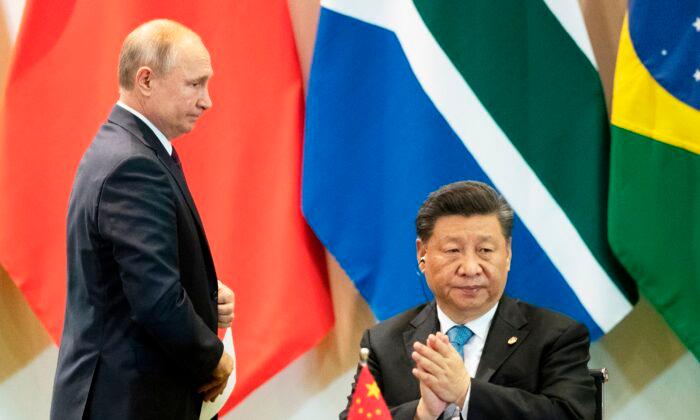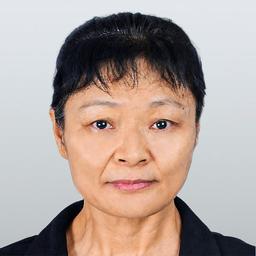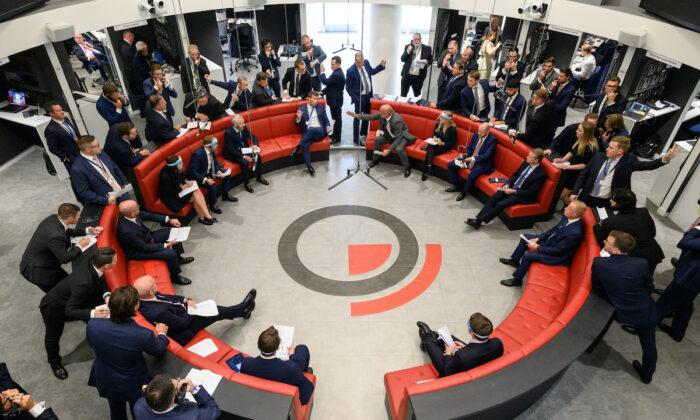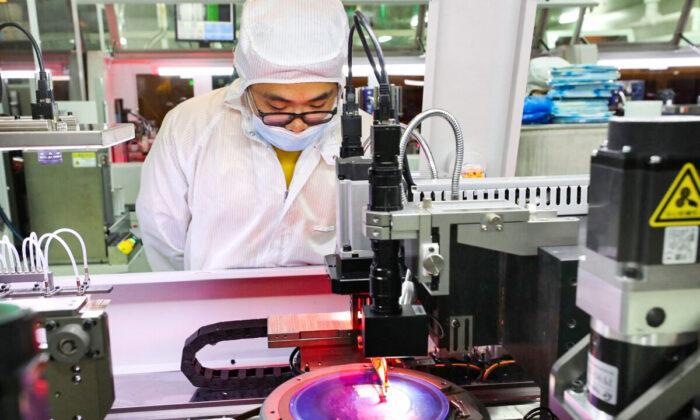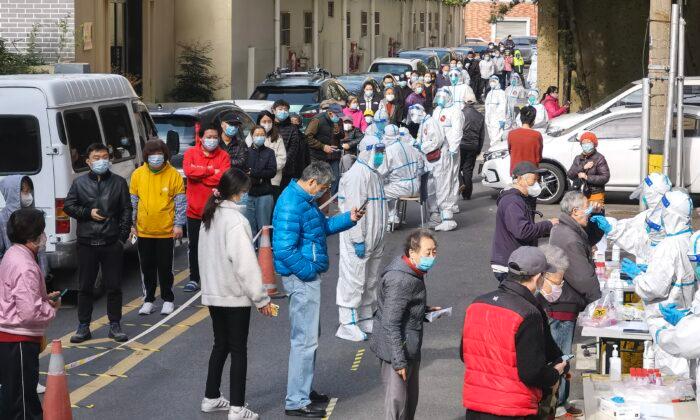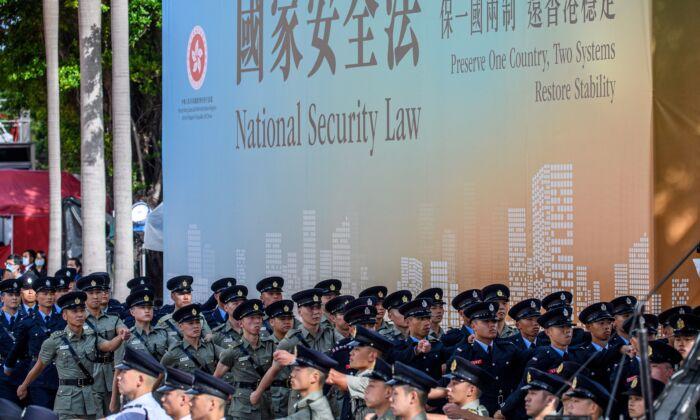China recently affirmed its intention to strengthen strategic cooperation with Russia to establish a “new type of international relationship” and other shared goals.
Political analysts interpret this as a public notice from the Chinese Communist Party (CCP) that China and Russia stand united against the Western democratic camp led by the United States.
According to an April 19 statement on the Chinese Ministry of Foreign Affairs’ website, China’s Foreign Vice Minister Le Yucheng met with Russian Ambassador Andrey Denisov on April 18 and told him that, regardless of the international situation, the CCP will “as always” strengthen strategic cooperation with Russia, safeguard the “common interests” of both parties, and promote the construction of a “new type of international relations” and a “community with a shared future for mankind.”
The statement on the Ministry’s website also said that Le Yucheng told Denisov it was under instructions from Xi Jinping and Putin, that the Sino-Russian “New Era Comprehensive Strategic Partnership of Coordination” continued to develop at a high level in the first quarter of this year and Sino-Russian bilateral trade increased by nearly 30 percent. Denisov responded that Russia is willing to deepen the partnership.
The meeting between Le Yucheng and Denisov came a day before the UN General Assembly debated a draft resolution limiting the veto power of the five permanent members of the Security Council. So far, the resolution has been supported by 57 countries, including the United States.
After Russia invaded Ukraine, the UN Security Council voted on a resolution condemning Russia’s aggression, but it was vetoed by Russia, which is a permanent member. China has consistently refrained from publicly condemning Russia and has also fallen behind many other countries in supplying humanitarian aid to Ukraine.
China has repeatedly mentioned Sino-Russian cooperation during the past year.
Early last year, Chinese Foreign Minister Wang Yi said in a statement on the Ministry’s website that “China-Russia strategic cooperation has no limit, no restricted area, no upper limit.”
At a press conference on Dec. 24 last year, Foreign Ministry spokesman Zhao Lijian once again repeated that “Sino-Russian cooperation has no limit, no restricted area, no upper limit.” China is willing to carry out “all-round mutually beneficial cooperation” with Russia in accordance with the consensus reached by Xi Jinping and Putin, Zhao said.
On Feb. 4 this year, the day of the opening ceremony of the Beijing Winter Olympics, Xi and Putin issued a joint statement, saying that “the friendship between the two countries has no end, and there is no restricted area for cooperation.”
Furthermore, Russian Foreign Minister Sergei Lavrov attended the Third Afghan Neighboring Foreign Ministers’ Meeting in China on March 30, as well as the separate “troika” meeting with special envoys from China and the United States.
New Cold War
Two Chinese political analysts, based outside China, interpret the April 18 statement by China’s Foreign Vice Minister Le Yucheng as a public notice from the Chinese Communist Party (CCP) that China and Russia stand united against the Western democratic camp led by the United States.Ji Da, a current affairs commentator and China Issues expert, called it “a landmark turning point in the CCP’s foreign strategy.”
“The CCP is publicly showing its intention of joining forces with Russia to fight the United States, and the Ukraine war is a symbolic start,” Ji Da told The Epoch Times. “This means that the world situation will undergo major changes in the context of the new Cold War in the U.S.-China bipolar confrontation.”
Ji Da said that the CCP’s decision to strengthen its strategic partnership with Russia is actually a last resort because the United States no longer trusts the CCP and regards it as its number one enemy.
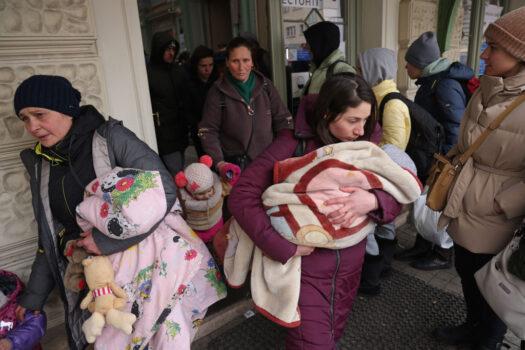
Ji Da explained that Xi Jinping abandoned the strategy of “hide your strengths, bide your time and never stand out,” advocated by former CCP leader Deng Xiaoping, and openly competes with the United States for dominance. Statements such as wanting to establish a “community with a shared future for mankind” and a “new international political and economic order,” etc., has aroused alarm in the United States.
US-China Decoupling
Mike Sun, a North American investment consultant and China expert, predicts that despite the CCP’s public support for Russia, it doesn’t dare act rashly for its own interests.Sun told The Epoch Times that senior officials, such as U.S. National Security Advisor Jake Sullivan, have been warning the CCP that aid provided to Russia will have serious consequences. Recently, even Treasury Secretary Janet Yellen warned the CCP that if they publicly support Russia militarily and in other ways, the United States would impose severe economic sanctions.
“In fact, the United States has already started a plan to decouple from the CCP in a comprehensive way. First, it is high-tech decoupling, then financial decoupling, and then export decoupling,” Sun said.
“If it wasn’t for the pandemic, the decoupling of exports would have happened sooner, and the CCP would not have enjoyed the export dividends last year. The United States has long been preparing to transfer its manufacturing base to Southeast Asia,” he said.
Of course, the CCP is also preparing for the U.S.-China decoupling, Sun added. “For example, the CCP has been hoarding grain. In addition to importing a large amount of grain, Xi Jinping has repeatedly emphasized that the Chinese people’s rice bowls must be firmly held in their hands, and that the bowls be mainly filled with Chinese grains.”
